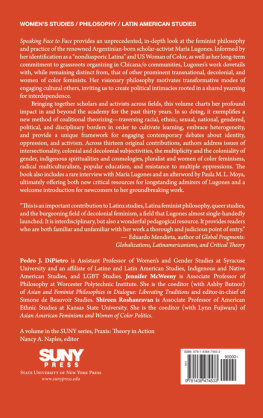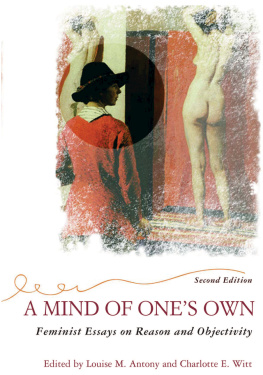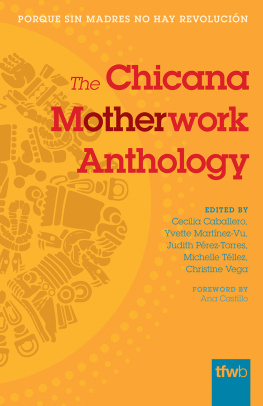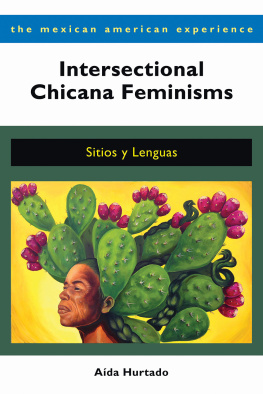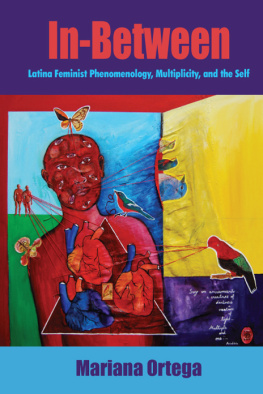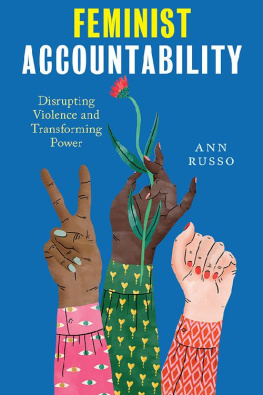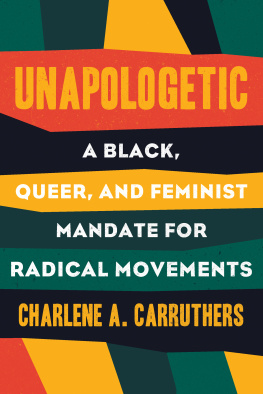Speaking Face to Face
SUNY SERIES, PRAXIS: THEORY IN ACTION
Nancy A. Naples, editor
Speaking
Face to Face
The Visionary Philosophy
of Mara Lugones
Edited by Pedro J. DiPietro, Jennifer McWeeny,
and Shireen Roshanravan
Cover image: Hunger. e nina jay.
Published by State University of New York Press, Albany
2019 State University of New York
All rights reserved
Printed in the United States of America
No part of this book may be used or reproduced in any manner whatsoever without written permission. No part of this book may be stored in a retrieval system or transmitted in any form or by any means including electronic, electrostatic, magnetic tape, mechanical, photocopying, recording, or otherwise without the prior permission in writing of the publisher.
For information, contact State University of New York Press, Albany, NY
www.sunypress.edu
Library of Congress Cataloging-in-Publication Data
Names: DiPietro, Pedro J., 1974- editor. | McWeeny, Jennifer, editor. | Roshanravan, Shireen, editor.
Title: Speaking face to face : the visionary philosophy of Mara Lugones / edited by Pedro J. DiPietro, Jennifer McWeeny, and Shireen Roshanravan.
Description: Albany : State University of New York Press, [2019] | Series: SUNY series, praxis: theory in action | Includes bibliographical references and index.
Identifiers: LCCN 2018033268| ISBN 9781438474533 (hardcover : alk. paper) | ISBN 9781438474540 (e-book)
Subjects: LCSH: Lugones, Maria, 1944- | Feminist theory.
Classification: LCC HQ1190 .S676 2019 | DDC 305.42dc23 LC record available at https://lccn.loc.gov/2018033268
10 9 8 7 6 5 4 3 2 1
To all those who commit to living and loving large against the expectations of a world that relies on our living and loving small. And, of course, to Mara Lugones, for inspiring us to see, feel, speak, think, cook, sing, dance, create, and enact impossible worlds of verifiable love into existence.
Contents
Pedro J. DiPietro, Jennifer McWeeny, and Shireen Roshanravan
Elizabeth V. Spelman
Kelli Zaytoun
(Brena) Yu-Chen Tai
Anna Carastathis
Shireen Roshanravan
Madina Tlostanova
Jennifer McWeeny
Manuel Chvez Jr.
Pedro J. DiPietro
Joshua M. Price
Cricket Keating
Sarah Lucia Hoagland
Paula M. L. Moya
Illustrations
Acknowledgments
The kind of thinking that Lugoness praxis calls for necessarily arises out of interpersonal engagements that are in turn situated within and among a variety of communities. This book would not have been possible without the dynamic interactions that we shared with each other and with the diversity of groups and individuals that have sustained us during the time it took to bring this project to fruition.
We acknowledge the College of Arts and Sciences at Syracuse University, the College of Arts and Sciences at Kansas State University, and the College of Arts and Sciences at Worcester Polytechnic Institute, for their generous support of our research and the production of this book. We are also grateful to the National Womens Studies Association for sponsoring two panels relevant to this collection at its annual meetings. This gave the editors and authors opportunities to receive valuable feedback. These events include a roundtable discussion on the book in Milwaukee, Wisconsin, in 2015 and a panel on Lugoness praxical philosophy in Denver, Colorado, in 2010.
We are grateful to two communities for playing an important role in cultivating practice and scholarship on Lugoness work and aiding significantly in our respective developments, albeit in different ways. First, thank you to the Center for Interdisciplinary Studies in Philosophy, Interpretation, and Culture (CPIC) at Binghamton University, and especially its members associated with the Politics of Women of Color Workshop and the Decolonial Thinking Workshop who have inspired many crucial conversations. Among them are Wanda Alarcn, Mazi Allen, Manuel Chvez Jr., Maria Chaves-Daza, Cindy Cruz, Josh Franco, Nelima Gaonkar, Colette Jung, Nikolay Karkov, Jen-Feng Kuo, Hilary Malatino, Xhercis Mendez, Chantal Rodais, Gabriel Soldatenko, Ovidiu Tichindeleanu, Tushabe, and Gabriela Veronelli. Second, the Latina Feminism Roundtable organized by Mariana Ortega at John Carroll University fostered several explorations of Lugoness work. Members, participants, and keynote speakers include Linda Martn Alcoff, Mariana Alessandri, Natalie Cisneros, Veronica Isabel Dahlberg, Brittan Davis, Theresa Delgadillo, Pedro DiPietro, Carmen Lugo-Lugo, Jacqueline Martinez, Jennifer McWeeny, Cynthia Paccacerqua, Laura Elisa Prez, Andrea Pitts, Monique Roelofs, Stephanie Rivera Berruz, Alexander Stehn, Gloria Vaquera, Sujay Vega, Ernesto Rosen Velasquez, Elena Ruz, Chela Sandoval, Ofelia Schutte, Daphne Taylor Garcia, and Kelli Zaytoun.
We express our sincere thanks to the artists who have granted us permission to reproduce their work on the books cover and in . We are also appreciative of the careful work of the editorial team at the State University of New York press, including Rebecca Colesworthy, Beth Bouloukos, Jenn Bennett-Genthner, and Michael Campchiaro. Thank you to John Wentworth for copy editing the manuscript with such keen attention, to Kirk Warren for the cover design, to Aimee Harrison for typesetting the manuscript, and to David Martinez for compiling the books index. Additionally, we are grateful to Nancy A. Naples for including this work in the Praxis: Theory in Action series.
Finally, this book was realized through the hard work, expertise, and care of each of its contributors. We are deeply grateful for their patience, perseverance, and insight through what was a long and demanding editing process. Together, these contributors are crafting and authorizing a field of research that emerges out of a deep engagement with Lugoness ideas, and they are thus bringing her visionary philosophy to more and more circles of people practicing resistance against multiple oppressions. We are grateful to Paula M. L. Moya for writing an afterword that emphasizes the playfulness and complexity of walking with Lugoness thinking. The advice and guidance of M. Jacqui Alexander was crucial for enriching the introduction and its potential for making connections across generations of antiracist feminist movements and across multiple sites of transnational and translocal solidarities.
Pedro : Echoes of many voices resonate in mine. They accompany me on a journey of self-transformation and collective transformation. They have brought me to this page, literally. Among these companions and their voices, I would like to especially acknowledge those I have known since the very beginning of life or whom I encountered in my childhood and have remained with me in a shared affective map: Yamile Dip, Hugo DiPietro, Ta Nen, Cecilia Sanchez DiPietro, Cristian DiPietro, Pachi Sanchez, Agustina Checa, Santiago Checa, Lidia Patagua, and Claudia Mendieta; my beloved companion Brian and the adorable nonhuman animals, Bisel and Inti, who have enriched our life together; those whose friendship or mentorship I cherish and whose presence sustains me in many waysLaura Elisa Prez, Joshua Price, Himika Bhattacharya, John Strohmeier, Gabriela Veronelli, Gloria Bonder, Eunjung Kim, Chandra Talpade Mohanty, Linda Carty, Ariel Monterrubianesi, Suronda Gonzalez, Joe Galante, Peter Fazo, and Maya Strohmeier; those whose political visions inspire my hemispheric sense of belonging to decolonizing collaborations, particularly the mentors, colleagues, and students of the coloniality/modernity/decoloniality network, the Association for Jotera Arts, Activism, and Scholarship, the Democratizing Knowledge Collective at Syracuse University, and the graduate and undergraduate students at the Latin American Graduate School of Social Sciences (FLACSO-PRIGEPP, Buenos Aires), Binghamton University, the University of California, Berkeley, and Syracuse University.

